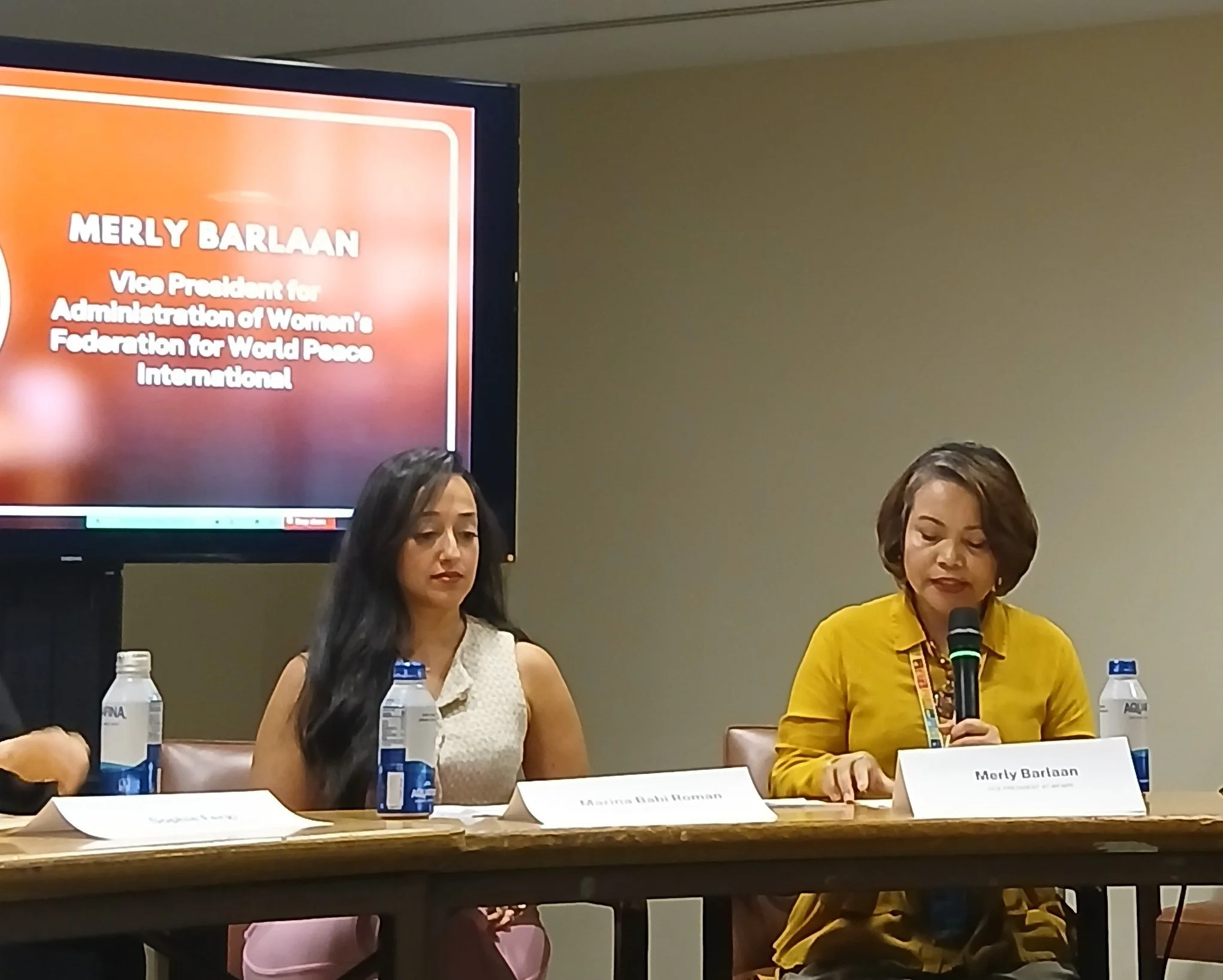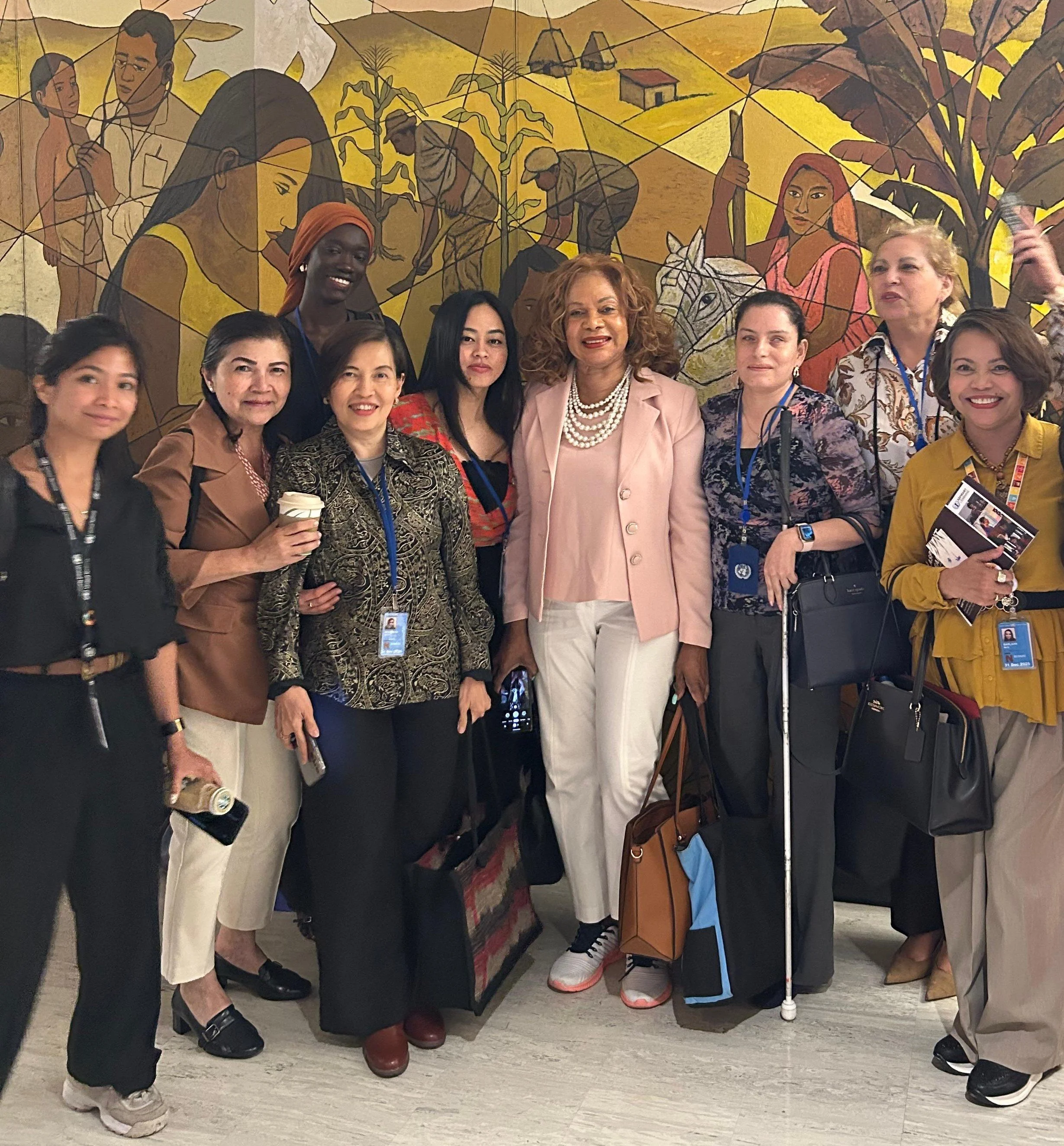Governments Should Empower Families to Protect Women and Girls – Barlaan
Merly Barlaan, Vice President, WFWP International Director, Offices for UN Relations was one of the panelists of the side event titled “Sexual Harassment as a Barrier to the Implementation of the SDGs” on July 14, 2025. She answered the question “In your view, how can value-based education and the role of families contribute to creating safer environments for young people? And how can we ensure these values are passed down across generations—not just through institutions, but through everyday life?”
Merly Barlaan, full speech:
“We live in a world where you must study 12 years to become a doctor, 8 years to become a lawyer—yet you need only 15 minutes to get married and raise a child. We train young people for the marketplace, but not for marriage, parenting, or moral leadership. Is it any wonder our families are breaking, our girls are being harmed, and our nations are losing peace at the most personal level?”
“If we want to prevent sexual harassment, restore dignity, and achieve the SDGs, then we must stop treating family as a private affair—and start treating it as national infrastructure. Because no SDG can be fulfilled if our sons are not taught respect and our daughters do not feel safe—even in their own homes.”
If we are serious about preventing sexual harassment and building peaceful, resilient societies, then we must expand the definition of education beyond academic achievement or workforce readiness.
Today, we celebrate nations that invest 12–20 years in preparing young people for STEM careers before granting them licenses to serve. But what about the institution that forms the very foundation of society—marriage and family?
Across the globe, any couple can obtain a marriage license after just a few hours—or even minutes—of orientation. There is no mandatory curriculum for parenting, no moral or emotional preparedness required to raise the next generation of human beings. And yet we wonder why families are failing, why women and girls are unsafe, and why boys grow up emotionally unprepared for responsibility.
In poor communities in the Philippines, we have witnessed firsthand the consequences of this imbalance. Young girls, sexually assaulted not by strangers, but by family members and relatives—because their mothers, driven by poverty, are forced to leave home for weeks at a time to work. These are not isolated incidents. They are fundamental systemic failures.
At WFWPI, we invest in empowering families to become a safe and healthy environment for women and girls and protection begins with values.
1. Value-Based Education as a Primary Prevention Strategy
Sexual harassment stems from distorted value systems. Value-based education addresses this at the root. It teaches dignity, empathy, and moral responsibility—not in theory, but through lived practice.
WFWPI’s “Dignity of Women Project” works directly with youth, especially boys, to internalize respect for women and dismantle harmful norms.
In the Philippines, and throughout WFWP national chapters around the world, our Family Education Programs bring parents, teachers, and young people together to address respect, emotional intelligence, and open communication—making families active partners in prevention.
2. The Role of Families as Culture Shapers for Future Generations
At WFWPI, we call the family the “School of Love.” Long before institutions intervene, the family teaches children how to relate, communicate, and love. When parents are empowered with theright tools, they raise children who are both morally grounded and emotionally intelligent.
Our best practices include intergenerational dialogue circles, here mothers, fathers, and children explore core values like integrity, empathy, and the dignity of women. These build protective environments that extend far beyond the home. Investing in training of parents as educators and institutional leaders to model moral leadership.
Before a child learns to speak, they learn how to love—and how to be loved. That lesson, taught in the quiet intimacy of family life, shapes the future of peace more powerfully than any law or policy.
This is not about religious values, the notion of the “Family as the School of Love” is universal, multi-cultural values that must be cultivated.
WFWPI’s “Family as the School of Love” education programs integrate family-building, nation-building and peace building as the blueprint to a sustainable world peace where women and girls are safe and protected.
3. Concrete Recommendations for Collaboration
Governments must recognize this gap and act with urgency. To achieve SDGs 3, 4, 5, 8, and 16, we recommend the following:
1. Integrate holistic family-building education into national curricula—with the same seriousness and investment given to STEM education.
2. Create certification programs in marriage preparation and parenting, accessible to all couples before entering family life.
3. Fund community-based family education centers as part of national development and women and girls protection strategies.
4. Include families as central stakeholders in the whole-of-nation approach to violence prevention, peacebuilding, and moral leadership.
We cannot continue to invest in machines more than we invest in mothers. We cannot afford to train engineers for 20 years but expect parents to raise future citizens without any formal guidance. If we do not educate our young people in love, in responsibility, and in family life, we will continue to see the very fabric of society unravel.
The SDGs are not only about economies—they are about people. And people are formed in families. Now is the time for governments to act—to invest in family-building as a matter of national security, peace, and dignity.
To truly achieve the SDGs, we must invest in the family as the first institution of peace. Value-based education is not peripheral—it is the transformational engine of dignity, safety, and justice.
When girls know their worth, and boys are taught to honor that worth, we raise a generation that will break the cycle of harm and build a future of peace.
Thank you!
Merly Barlaan speaks about the importance of governments empowering the family as an institution for love and respect, a fundamental way of curbing sexual harassment and violence.
Participants of the side event 'Sexual Harassment as a Barrier to the Implementation of SDGs' on July 15, 2025 at the UN New York Hq.
WFWP representatives attending the youth-led side event on Sexual Harassment as a Barrier to the Implementation of SDGs.



